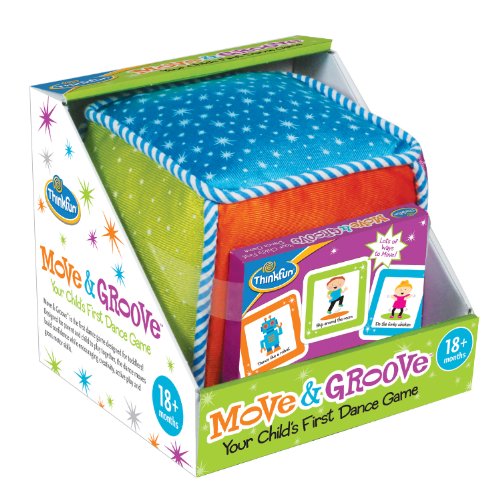
By the time they hit preschool, kids 3 and up can actually follow two-part directions and somewhat regulate their emotions. And that’s your moment to strategically deploy educational games and toys to keep them entertained while also, insidiously, helping them with their development as functional human beings. But keep your expectations in check: Yes, preschoolers can play basic games. But this is not going to be an epic, hours-long Scrabble or Catan deathmatch.
“When they show you they have an interest in games with rules, you can gradually introduce the idea of turn taking and what the rules are, but most 3-year-olds only last one turn and wander off,” cautions Julia Luckenbill, the program coordinator at the Center for Child and Family Studies at UC Davis. “I had the most success with my daughter when she was 3, in the game of Count Your Chickens, because we were doing teamwork, and we made the odds good so that together we always won, meaning she didn’t need to both regulate strong emotions and follow directions at the same time.”
So pick games that are easy to follow, without complicated, convoluted directions that will frustrate young children. Make sure they feature engaging characters that kids love, like squirrels or chickens, or concepts that they can understand, like moving a ball around. And better yet if kids are not competing against each other, because losing sucks. Especially when you’re 3.
A silly (in the best sense) game in which kids wear silly glasses and answer silly questions: Am I an animal? Am I big? Do I make noise? Am I small? The object is to answer those questions, while wearing silly glasses, in a set amount of time. All while learning about turn-taking.
A beautifully-made game that will last years, this one lets kids play shuffleboard on one side and flick-the-disc on the flip side. It helps kids work on their concentration and develop their gross motor skills, plus they have to take turns. Also, it's just damn fun.
Kids love this game, for good reason. They learn about colors as they help squirrels find their acorns. Plus, they work on their matching skills and and the concept of taking turns. Children spin the spinner and scoop up matching acorns with a special tool; the first player to collect five acorns is the winner.
Almost (almost) too pretty to use. Players form two teams, maneuver the handles that match your team color, and twist and move the bars to score goals. It's indoor soccer, but elevated. Because just look at this thing.
Hairy pickles and furry donuts? Yes, in this game, which gives kids the chance to practice a bunch of different skills in a relaxed, cooperative way. Kids can play this game as three different levels (it's ideal for ages 3 to 6), which means they won't be bored. Kids learn about body awareness, plus they work on their motor skills, counting, and cooperation as they work together to feed the Woozle all manner of gross foods.
Kids 3 and up collect Mother Hen's chicks and return them to the chicken coop. It's a fun and funny cooperative counting game for the whole family that teaches children about the power of working together to solve a problem.
This game is ridiculously simple yet ridiculously fun. Preschoolers spin the spinner and use the squeezer to pick up the food item that matches the shape. It's a great shape-matching game that also helps toddlers develop motor skills.
So you think you can dance? Kids as young as 2 can work on their coordination, spatial orientation and confidence. You toss the plush cube to determine a color, choose a matching colored card and perform the directed move. You make a fool of yourself for your kids' amusement. What could be better?
If your kids loved Sneaky, Snacky Squirrel, meet the rabbit version. In the hide-and-seek carrot game, the bunny needs help hunting colorful carrots. The game is super-engaging, really enjoyable, and easy to follow. And it also teaches preschoolers hand-eye coordination, fine motor skills, and much-needed social skills.
- Trusted by Families Worldwide - With over 50 million sold, ThinkFun is the world's leading manufacturer of brain games and mind challenging puzzles
- Develops critical skills – Encourages creativity, active play and gross motor skills, and provides a perfect stealth learning experience for your toddler
- What you get - Roll and Play is made with a plush cube, and comes with 48 game cards which provide endless learning opportunities and lots of fun Also includes a storage pocket for cards, and a parent's guide Roll and Play was featured on 'The View' and is one of the best gifts you can find for your toddler
- Clear instructions – Easy to learn with a clear, high quality instruction manual You can start playing right away
- Award winner - Winner of many awards including the Play Advances Language Award, Oppenheim Platinum Award, and more Also a Toy of the Year Finalist
A classic that develops hand-eye coordination, this corn hole set is easy and quick to setup. Enjoy it outdoors or use it inside on rainy days. It reinforces simple math skills and builds team spirit. Kids can also play alone if they choose to do so.
Kids 3 and up use this screen-free device to create their own personalized stories, choosing characters and settings.
Every product on Fatherly is independently selected by our editors, writers, and experts. If you click a link on our site and buy something, we may earn an affiliate commission.
Related Articles:
- Should Kids Go Back to School this Fall? Parents Are Divided.
- Sesame Street Is Reopening This Month: Here's What That Means
- Don't Show New Movies in Theaters. Release Films To Streaming.
- Harry Potter Movies Are Already Leaving HBO Max — But Why?
The post The Best Educational Games for Preschoolers appeared first on Fatherly.












